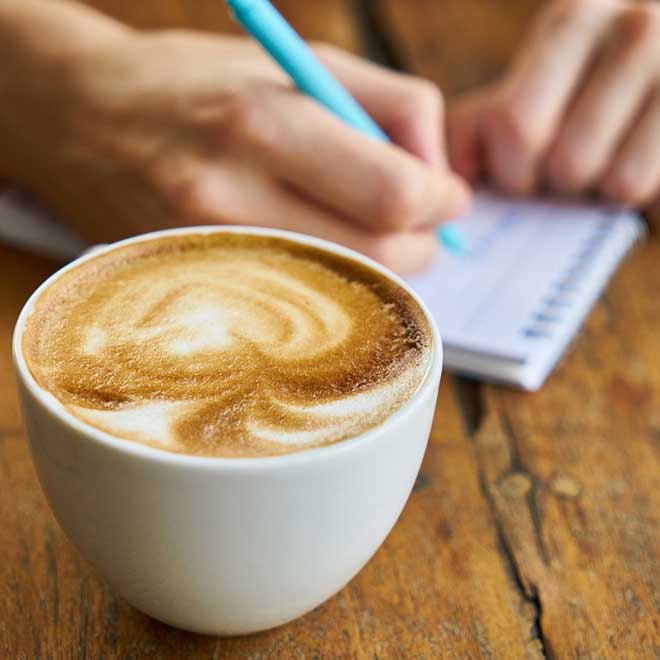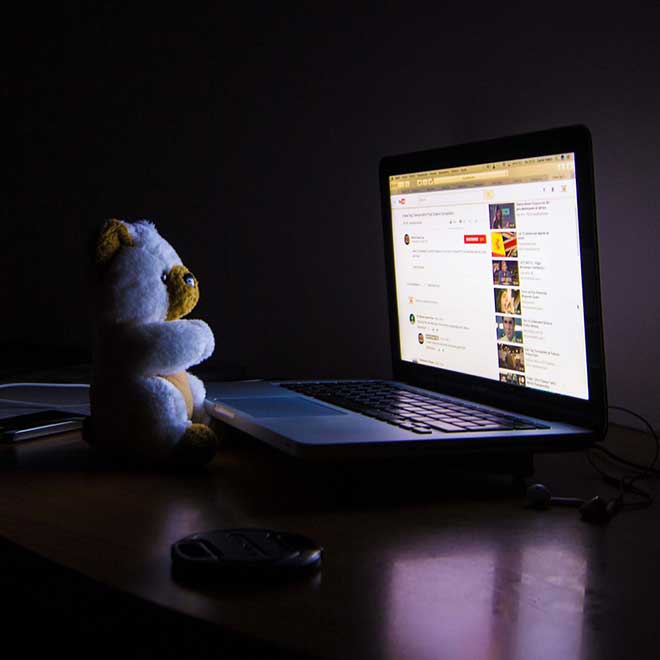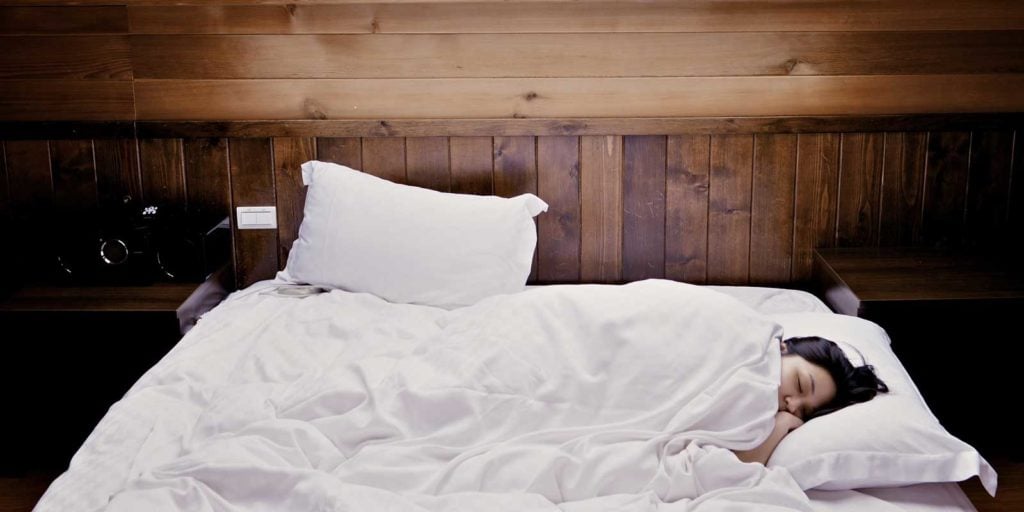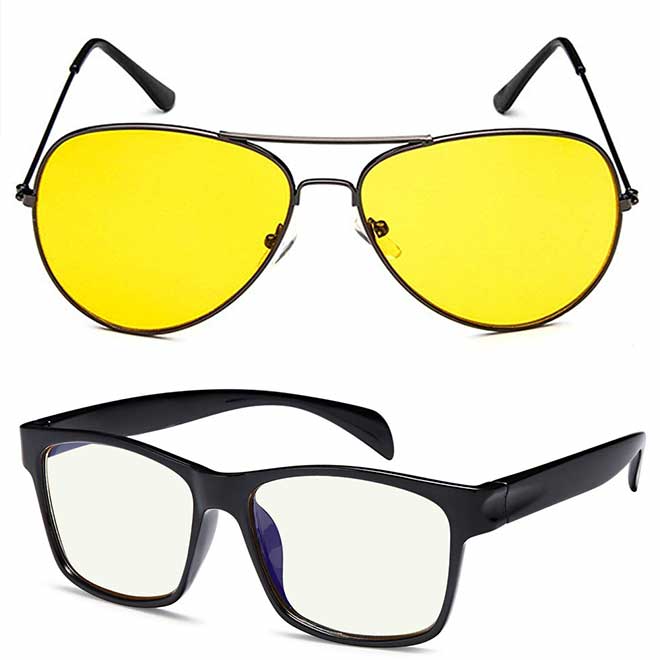Last Updated: November 3, 2019. Read time: 7 minutes.
It’s 3 a.m. and you are still awake staring at your ceiling? Do you have trouble falling asleep at night or sleeping through the whole night?
Long periods of disturbed sleep/wake cycles are called insomnia. Causes of chronic insomnia can often include medical conditions and lifestyle choices.
In this article, you will find 24 natural home remedies for occasional insomnia and better sleep. These sleep habits are best practices within the biohacking community. You don’t have to implement or follow all of them at once. Just improve one or two patterns and see what changes for you.
Daytime Habits for Better Sleep
Sleep is so vital for our mental and physical performance, overall health, and happiness. It influences everything in our lives, and vice versa, a lot of areas in our life influence our sleep.
Exercise in the Mornings
Doing a workout in the morning not just boosts your happiness level over the day, 1 but can also help you to fall asleep faster at night (In brackets you will find links to relevant studies: #1 #2). If you are currently working out in the evenings, try switching your routines. My personal experience is that I sleep way better on days where I did a morning workout.
No Caffeine After Lunch

Caffeine has an elimination half-life of up to 9.5 hours (#3) in the human body. Meaning, if you drink a coffee at 1 p.m., you will still have half of the caffeine of the same coffee in your body at 9 p.m. That can easily cause insomnia.
My recommendation: Try to have your last coffee at least 10 hours before going to bed. Or even better, try to skip coffee at all. And if you can’t go without coffee, go and try a biohacking coffee recipe.
No Stimulants Close to Bedtime
Avoid these at least 3 hours before bedtime: Alcohol, Nicotine, Cannabis (except CBD, see the Biohacker’s Tools & Supplements Box below) (#4 #5 #6).
Dine Early
Processing food is one of the most exhausting activities for your body. Have your last meal of the day at least 3 hours before going to bed. Studies indicate that this might also benefit your overall health (#7 #8).
Andrew Huberman’s Sleep Cocktail
Try out Andrew Huberman’s Sleep Cocktail containing Magnesium, Apigenin, Theanine, Glycine and GABA.
Establish a Shut-Down Routine After Work
Have you ever come home after work, sat down at the dinner table, and thought about your job? Yes, this is a rhetorical question. Everybody has. Thinking about work after work may impact your ability to relax deeply and also to perform the next day in the office.
In his book ‘Deep Work’ Cal Newport suggests establishing a shut-down routine to shut off mentally entirely from work and to avoid any thoughts about work after work (#9 #10).
A shut-down routine can be a 5-minute walk in the park and a personal mantra you say or singing your favorite song loudly in the car while commuting home. If you do this a couple of times and put a mental effort on being present in the moment and not thinking about work, this will create an anchor that instantly calms your body and mind down.
Deep Relaxation
I will keep this short and link an in-depth article on the art of deep relaxation here later. Try out deeply relaxing practices like doing sauna, massage, meditation, yoga, or pilates. A reflexology foot massage can help you sleep better (#34).
Fewer Screens, More Sleep
The evidence is crystal clear: Staring at screens (smartphone, TV, laptop) 1 to 2 hours before going to bed reduces our sleep quality. This is caused by the reduced melatonin production in our brains and our busy mind (#11 #12).
Try to avoid screens at least 1 hour, better 2 hours before going to bed. See also the blue-light-blocking glasses and recommendations on screens in the Biohacker’s Tools & Supplements Box down below.

Sleep with an Empty Bladder
Do you ever wake up in the middle of the night and have to pee? A lot of people can avoid this by having the last glass 90 to 120 minutes before going to bed (#13).
Experiment with Hot & Cold Showers
Cold showers and cold plunges are ‘the thing’ in the biohacking community for years now. Wim Hof made them famous and also scientifically relevant (#14). Case studies state both: Hot as well as cold showers before bedtime can improve your sleep quality.
Nighttime Habits for Better Sleep
Regular Sleep & Wake Up Time
The human body works best when you get up at the same time every morning and go to bed at the same time every night. Yes, even on the weekends, when you could sleep longer (#15).
Sleep Before 10 p.m.
‘Oh, hilarious, Max. I am a night owl!’ – Before you skip this habit: I was a night owl once, too. In my early twenties as a student, I loved to work until 1 or 2 in the morning and barely made it to the first 9 a.m. class on time.
Some theories (#16) claim that humans are genetically programmed to be early birds, hummingbirds, or night owls. Other theories claim that our sleep schedule preference is just a habit and, therefore, can be changed.
Ayurvedic medicine claims that your body rests the most between 10 p.m. and 2 a.m. After 10 p.m. the ‘Pitta’ cycle starts, which makes it harder to fall asleep (#17). The important thing here: You should already be asleep at 10 p.m. and not only in bed.
I changed my student sleep schedule and tried out different sleep schedules over the years. For the past five years, I have been sleeping from 9 p.m. to 5 a.m., waking up well-rested in the morning.
7 – 9 Hours of Sleep
Yup, that seems to be a must. ‘Sleep is for the weak’ and bragging about your 5-hour sleep night is so 90s. These days Silicon Valley entrepreneurs brag about their 8-hour deep sleep score (#18). And it’s scientifically proven too that the closer you get to 8 hours, the better for you (#19 #20).
Let’s Get Naked
At least in your bed. Several studies indicate that your body can sleep better without leaving on those annoying underwear (#21).

Meditation
This trend is not a fad. There are many reasons why so many people started meditating in the last years. It does not just boost your overall well-being and happiness. There are more than 1,000 studies concerning the benefits of meditation. One of the advantages is better sleep (#22 #23). Suggestion: Try meditating for 20 minutes in the early evening before you are super tired
The Biohacked Bedroom for Better Sleep
If you went through all of the daytime and nighttime habits, you realize: It requires conscious effort. But isn’t it worth it when the result is a much better life quality? Here are things you can additionally do in your bedroom to improve your sleep and have less insomnia.
Silence
Pretty obvious: If you live next to a highway or close to a nightlife hot-spot, that will negatively impact your sleep. Your bedroom should be as quiet as possible.
Darkness
And I mean very dark. Pitch black. If you can see your hand at night, that is too bright. Darkness is crucial for good sleep. Make sure no light shines through the windows, and no gadgets are illuminating the room with their LED status lights (#24).
Air Quality
You should have clean and fresh air in your bedroom (#25 #26). The ideal relative humidity for health and comfort is about 40-60% (#27). Plants can help to clean the air in your bedroom during the day (#28).
Temperature
Most studies indicate that the optimum temperature for sleep is between 60 and 67 Fahrenheit (16° to 19°C) (#29 #30).
Lights
Avoid bright and bluish lights in the bedroom. See more explanation on blue light down below in the Biohacker’s Tools & Supplements Box.
Airplane Mode On and EMF Off
There is emerging evidence that electromagnetic fields (EMFs) can influence your sleep negatively (#31 #32). Three simple ways to reduce EMFs at night:
- Switch off your wifi. Unplug your router. Many wifi routers also have an admin menu to automatically switch off the wifi function according to a schedule.
- Switch your phone to airplane mode. This also helps you to be less stressed about potential calls or notifications.
- Put your phone at least 2 meters / 6 ft away from your bed. It will also force you to get up and turn off your alarm in the morning. Which means you are more likely to stick to your new regular sleep schedule.
Out of Your Control
When I lived in Zurich in an apartment building, we had a very loud family as neighbors. They were screaming through the stairway in the middle of the night and had loud fights at random times. This situation was combined with an older building and poor noise isolation towards the stairway.
After six months, we moved out. Our sleep quality increased by at least 50%. Except for some nights when waking up due to ringing cowbells. But that’s Switzerland and another story.
Biohacker’s Tools & Supplements Box
These tools and supplements are recommended and used daily in the biohacking community to improve sleep.
Blue Light Blocking Glasses

Seeing blue light before going to bed is very unnatural for the human body (#11). When we see blue light, our brain produces less melatonin, which is essential to let the body sleep.
Blue light blocking glasses come in two designs: 1) The ‘Fear and Loathing in Las Vegas’ style yellow shades and 2) The way more subtle just regular looking glasses. They block 40 to 60% of the blue light and thereby help the brain to produce more melatonin.
Flux
Adding to the blue light problem mentioned above: A lot of devices offer now a ‘night shift’ mode that shows a less intense blue. For your laptop, I recommend getting a free software called Flux. Flux automatically adjusts the colors on your screen depending on your wake up time, location, and time of the day.
Ojai Energetics Full Spectrum Hemp Elixir
Cannabidiol (CBD) has been shown to help up to 67% of people to improve their sleep scores (#33). Ojai Energetics Hemp Elixir is my favorite CBD product so far. And I’ve tested a dozen different ones to help me sleep deeper and fall asleep faster. You can read my full review of the Ojai Energetics CBD product here. CBD has
Start Now!
You want better sleep and read this whole article? Which two new sleep biohacking habits will you try out tonight or tomorrow?
Resources & Studies
- http://jcsm.aasm.org/ViewAbstract.aspx?pid=29078
- https://aasm.org/a-little-bit-of-exercise-can-go-a-long-way-to-improve-sleep-and-wellness/
- https://www.ncbi.nlm.nih.gov/books/NBK223808/
- https://www.healthline.com/health-news/it-might-not-be-the-coffee-that-causes-you-to-wake-up-during-the-night
- https://www.ncbi.nlm.nih.gov/pubmed/19345124
- https://www.ncbi.nlm.nih.gov/pmc/articles/PMC1402564/
- https://www.psychologytoday.com/us/blog/your-brain-food/201206/eat-early-stay-healthy-and-sleep-better
- https://www.ncbi.nlm.nih.gov/pmc/articles/PMC4425165/
- https://www.calnewport.com/blog/2009/06/08/drastically-reduce-stress-with-a-work-shutdown-ritual/
- https://www.amazon.com/Deep-Work-Focused-Success-Distracted/dp/1455586692
- https://www.health.harvard.edu/staying-healthy/blue-light-has-a-dark-side
- https://www.ncbi.nlm.nih.gov/pmc/articles/PMC5703049/
- https://www.sleepfoundation.org/articles/nocturia-or-frequent-urination-night
- https://www.wimhofmethod.com/science
- https://www.ncbi.nlm.nih.gov/pmc/articles/PMC2718885/
- https://www.nature.com/articles/s41467-018-08259-7
- https://drlonsdorf.com/sleep/
- https://www.independent.co.uk/life-style/health-and-families/sleep-is-the-new-status-symbol-a7676466.html
- https://www.sciencedirect.com/science/article/pii/S0091743511002878
- https://academic.oup.com/sleep/article/38/6/843/2416939
- https://valleysleepcenter.com/7-reasons-to-sleep-naked/
- https://www.researchgate.net/publication/257795314_The_Effects_of_Mindfulness_Meditation_A_Meta-Analysis
- https://www.frontiersin.org/articles/10.3389/fneur.2012.00054/full
- https://academic.oup.com/aje/article/187/3/427/4056592
- https://academic.oup.com/sleep/article-abstract/42/Supplement_1/A74/5451752?redirectedFrom=fulltext
- https://www.ncbi.nlm.nih.gov/pubmed/30571166
- https://www.ncbi.nlm.nih.gov/pmc/articles/PMC1474709/
- https://ntrs.nasa.gov/search.jsp?R=19930073077
- https://amerisleep.com/blog/ask-science-is-cold-good-for-sleep/
- https://www.ncbi.nlm.nih.gov/pmc/articles/PMC5446217/
- https://www.sciencedirect.com/science/article/pii/S0891061815000599
- https://www.researchgate.net/publication/228363510_Study_of_the_health_of_people_living_in_the_vicinity_of_mobile_phone_base_stations_I_Influences_of_distance_and_sex
- https://www.ncbi.nlm.nih.gov/pmc/articles/PMC6326553/
- https://www.ncbi.nlm.nih.gov/pmc/articles/PMC5187550/
Disclaimer: This post is based on the evidence and routines of thousands of self-optimizers as well as scientific studies where quoted. This is no medical advice and does not replace any doctor’s visit. Obviously, if you have any medical condition go and see your doctor.